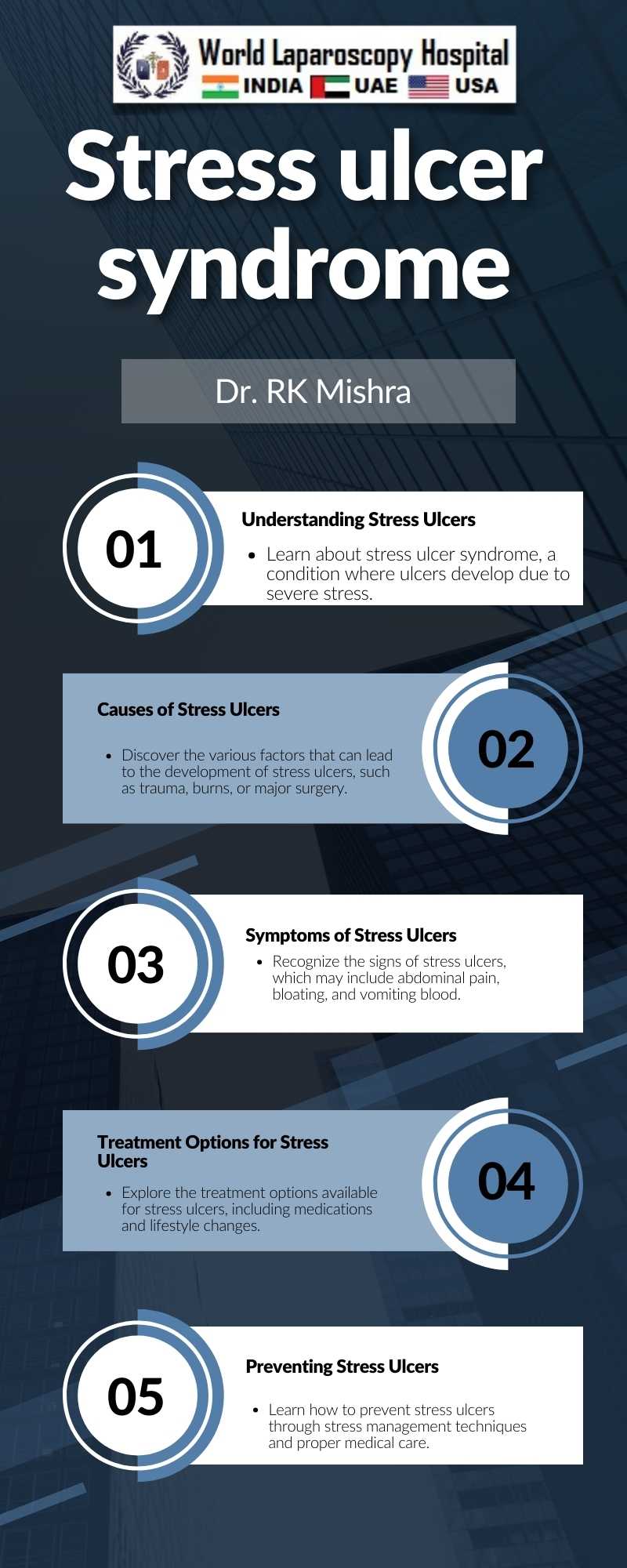Stress ulcer syndrome: Ulcers that develop due to the stress of surgery or critical illness
Stress Ulcer Syndrome: Ulcers that Develop Due to the Stress of Surgery or Critical Illness
Stress ulcer syndrome, also known as stress-related mucosal disease, is a condition characterized by the development of ulcers in the gastrointestinal tract due to the physiological stress of surgery or critical illness. These ulcers can occur in the stomach, duodenum, or esophagus, and they pose a significant risk to patients undergoing major surgery or those who are critically ill.

The development of stress ulcers is closely linked to the body's response to stress. During times of physical or emotional stress, the body releases hormones such as cortisol and adrenaline, which can lead to increased acid production in the stomach and decreased blood flow to the gastrointestinal tract. These changes create an environment in which the protective lining of the stomach and intestines is compromised, making them more susceptible to damage from stomach acid and other digestive juices.
Patients at risk for stress ulcers include those undergoing major surgery, especially in the ICU setting, as well as those who are critically ill due to conditions such as sepsis, trauma, or burns. Additionally, patients who are on mechanical ventilation or receiving high-dose corticosteroids are also at an increased risk.
The symptoms of stress ulcers can vary depending on the location and severity of the ulcers. Some patients may experience no symptoms at all, while others may experience abdominal pain, bloating, nausea, vomiting, or bloody stools. In severe cases, stress ulcers can lead to life-threatening complications such as perforation of the stomach or intestine, which can result in severe bleeding or infection.
Preventing stress ulcers in high-risk patients is a critical aspect of their care. This can be achieved through a combination of pharmacological and non-pharmacological interventions. Proton pump inhibitors (PPIs) and histamine receptor antagonists (H2 blockers) are commonly used to reduce stomach acid production and protect the gastrointestinal lining. Additionally, stress ulcer prophylaxis guidelines recommend early enteral nutrition, avoiding unnecessary corticosteroid use, and providing adequate pain control to reduce the risk of stress ulcers.
Conclusion
Stress ulcer syndrome is a serious condition that can develop in patients undergoing major surgery or those who are critically ill. It is important for healthcare providers to be aware of the risk factors and symptoms of stress ulcers and to take appropriate measures to prevent and treat them in high-risk patients. By understanding the underlying mechanisms of stress ulcer development and implementing appropriate interventions, healthcare providers can help reduce the incidence and severity of stress ulcers in vulnerable patient populations.
Stress ulcer syndrome, also known as stress-related mucosal disease, is a condition characterized by the development of ulcers in the gastrointestinal tract due to the physiological stress of surgery or critical illness. These ulcers can occur in the stomach, duodenum, or esophagus, and they pose a significant risk to patients undergoing major surgery or those who are critically ill.

The development of stress ulcers is closely linked to the body's response to stress. During times of physical or emotional stress, the body releases hormones such as cortisol and adrenaline, which can lead to increased acid production in the stomach and decreased blood flow to the gastrointestinal tract. These changes create an environment in which the protective lining of the stomach and intestines is compromised, making them more susceptible to damage from stomach acid and other digestive juices.
Patients at risk for stress ulcers include those undergoing major surgery, especially in the ICU setting, as well as those who are critically ill due to conditions such as sepsis, trauma, or burns. Additionally, patients who are on mechanical ventilation or receiving high-dose corticosteroids are also at an increased risk.
The symptoms of stress ulcers can vary depending on the location and severity of the ulcers. Some patients may experience no symptoms at all, while others may experience abdominal pain, bloating, nausea, vomiting, or bloody stools. In severe cases, stress ulcers can lead to life-threatening complications such as perforation of the stomach or intestine, which can result in severe bleeding or infection.
Preventing stress ulcers in high-risk patients is a critical aspect of their care. This can be achieved through a combination of pharmacological and non-pharmacological interventions. Proton pump inhibitors (PPIs) and histamine receptor antagonists (H2 blockers) are commonly used to reduce stomach acid production and protect the gastrointestinal lining. Additionally, stress ulcer prophylaxis guidelines recommend early enteral nutrition, avoiding unnecessary corticosteroid use, and providing adequate pain control to reduce the risk of stress ulcers.
Conclusion
Stress ulcer syndrome is a serious condition that can develop in patients undergoing major surgery or those who are critically ill. It is important for healthcare providers to be aware of the risk factors and symptoms of stress ulcers and to take appropriate measures to prevent and treat them in high-risk patients. By understanding the underlying mechanisms of stress ulcer development and implementing appropriate interventions, healthcare providers can help reduce the incidence and severity of stress ulcers in vulnerable patient populations.
1 COMMENTS
Dr. Rahul Pareek
#1
Feb 20th, 2024 7:31 pm
Stress ulcer syndrome poses significant risks in surgical and critically ill patients. Healthcare providers must recognize risk factors and symptoms, implementing preventive measures and timely treatment to mitigate complications, thus enhancing patient outcomes and well-being.
| Older Post | Home | Newer Post |





